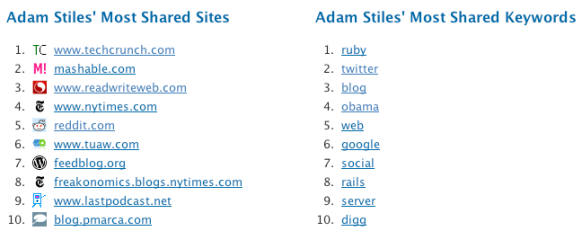Updated: I added support for APML (attention profile markup language) for your attention data. Mine is here.
Above is a screenshot of a new feature I’ve been playing around with on LinkRiver: attention data. Clicking on a user’s “attention” tab will show the top sites and the top keywords from links shared by that user. Click through about to see my attention data — I’m interested in Ruby, Barack Obama, MySQL, Nginx, Twitter, the iPhone, etc. My friend Chris, a chemist for biofuel startup PrimaFuel, has different interests: energy, solar, Barack Obama, and energy. What do you think?


I’m not sure yet whether the keywords are useful, but I love the addition of “most shared sites.” When you’re ready to work with APML, drop me an email – would be nice to enable LinkRiver and FeedDemon to easily share attention data.
I’m not sure about “keywords” either… am hoping it maps in some way to the APML idea of “concepts”. We’ll see 😉
Nick – I just added APML support. Let me know what you think. It would be nice for LR and FD to share attention data easily.
NIce to see APML export added so quickly! A few suggestions, though:
1. Name the file something other than “Attention.xml,” since AttentionXML is a separate format. Attention.apml would work.
2. I think the concepts need to be in the ExplicitData section.
3. All of the sources are type text/html, even when they were imported from RSS feeds. This makes it hard to import into RSS readers. When LinkRiver knows the source is a feed, could it output them as application/rss+xml?
4. The name for all of the sources is based on the source’s domain rather than the actual site/feed title. Can the title be preserved?
Nick — thanks for the comments.
1. I changed the resource name from attention.xml to apml.xml. The attention.xml file will still be served, but the apml.xml is reference in the link/meta tag and directly from the user’s attention page.
2. I’m not sure about that. From the wiki: http://apml.pbwiki.com/FrontPage
“Explicit data is for items that are explicitly added by a user to represent something. So for example, a user could edit their own APML file and add items they know they’re interested in. That’s why the updated tag isn’t needed on items in ExplicitData, because it’s a manual process.”
“Implicit data, it is added by machines/computers that try to make some informed guesses about the things that you are interested in. This stuff will change over time and are added with a certain degree of confidence that may have a decay in certain applications.”
I chose to put keywords (extracted from the titles of shared links) in the implicit data section because they are application-generated guesses that may change over time. The links themselves were explicitly added by the user, but the concepts are machine extractions.
What do you think?
3. The feeds tend to be del.icio.us or Google Reader or NewsGator feeds with links pointing to text/html resources. Its the resources that the user is sharing, and I’m just showing a top-level summary (just host names). I guess I could “crawl” the top-level page and look for the RSS feed (one may or may not exist)…. hmmm. LR really doesn’t know if the user is accessing a given site by feed or directly, so I hesitate to list the feed. Am I off base?
4. That’s my laziness. I’m not capturing titles for top-level resources yet (users tend to share individual pages, not the top-level page). I’ll add that to my list. Good suggestion.
I really love the Netcaptor. Today, I go to netcaptor.com and saw the announcement. I am so sorry to hear about it although I knew it was not updated for serveral years. It is really good browser although I knew it is under the IE core. I wish it can come up again. Thank you! Adam!
Ah, you’re probably right about #2. I add keywords to the explicit section because I extract them from FeedDemon watches, which the user explicitly creates. But LinkRiver is getting the keywords from the content, so it really is implicit.
And I see what you mean about #3. I guess when importing your APML into an RSS reader, it’s up to the RSS reader to auto-discover the feed from any HTML sources.
Well done with the APML support Adam – sounds like you are in great hands with Nick helping out 🙂
I will put your post into the APML feed for others to see! Make sure you list your service on the wiki!
Chris